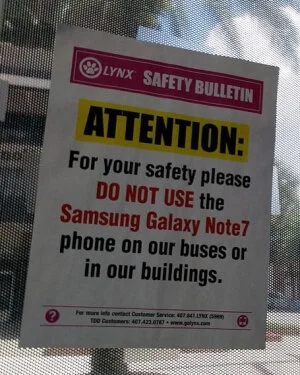Case 5: Getting burned by past successes
This post is number five in my series looking at cases where it seems that "believing we are right" has led to bad outcomes, sometimes even spectacularly bad results, for leaders, teams and organizations.
For my upcoming book, Big Decisions: Why we make decisions that matter so poorly. How we can make them better, I have identified and categorized nearly 350 mental traps and errors that lead us into making bad decisions. The many high-profile situations that I have examined demonstrate the bad outcomes that can be produced by mental traps and errors. My premise is that, at the least, if we recognize and admit that we don't know the answer, we will put more effort into looking for better decision options and limiting the risks stemming from failure when making important decisions.
In this case, the team's past success led it to believe that the current situation could not be as bad as it was..
A HOT NEW SMARTPHONE
Samsung's leaders believed that the smartphone giant had a winner when it introduced its flagship Galaxy Note 7 smartphone with a new longer life lithium-ion battery.
After weeks of reports of phones bursting into fire, Samsung issued two separate recalls and ultimately had to permanently withdraw the phone from the market.
What likely misled Samsung's leaders?
Samsung felt it was in familiar territory when it thinned down its new phone and battery. It was undercut by the Familiarity Heuristic (our tendency to believe that our behavior is correct to the extent that we have done it before, that past actions are proof that current actions are appropriate). Samsung believed it knew what it needed to to make its new state-of-the-art cellphone and battery - when it clearly did not know enough.
Samsung was quick to recall the phone after fires began to be reported. It soon was convinced it had rectified the phone's flaws and quickly started issuing replacement Note 7s. But then Samsung had to stop exchanging recalled Note 7 devices due to reports of replacement phones catching fire, just as the original phones did. The company's reputation was harmed by its Bayesian Conservatism (the tendency to revise one's belief insufficiently when presented with new evidence), in this case its initial thinking that it could repair or tweak the phone rather than needing to abandon the product.
The Sunk Cost Fallacy (our tendency to persist in achieving a goal to justify past investment, no matter the prognosis) likely slowed Samsung's decision making and drove its persistent commitment to the Galaxy Note 7.
We often find it extraordinarily difficult to leave the past behind and appraise what's ahead based on current evidence, uncolored by what came before.
Photo: "Samsung Galaxy Note 7 Bulletin" by elisfkc, licensed under the Creative Commons Attribution-Share Alike 2.0 Generic license
I expect to publish my new book, Big Decisions: Why we make decisions that matter so poorly. How we can make them better, later this year. It will be an antidote for bad decision individual and organizational decision making. You can help me get it published and in the hands of decision makers whose decisions not only affect their lives but all of ours.
Learn more about Big Decisions: Why we make decisions that matter so poorly. How we can make them better and my special half-price pre-publication offer. Thank you!

